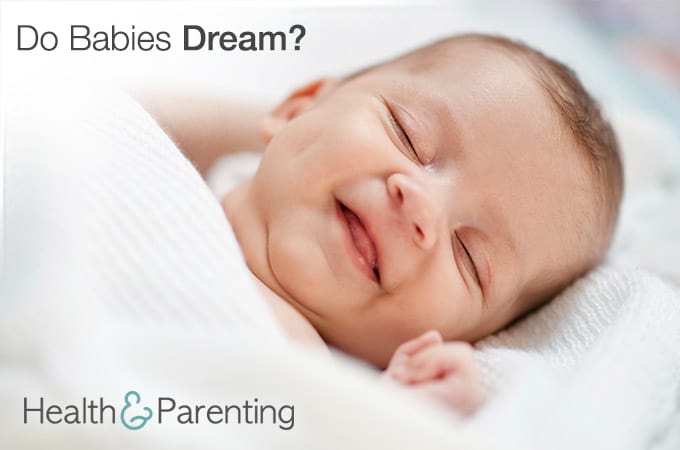You’re snuggling your little one to sleep and look down to see a tiny smile flickering across her face. You love watching her sleep – the calm breathing and soft warm body against yours. When she first falls asleep, you notice her twitching eyes and small body movements – and you wonder what she might be dreaming about, hopeful it’s about the pleasant life you have created for her filled with mother’s love.
Sleep Cycles
Adults move through 5 sleep cycles, starting off in deep sleep and moving into lighter sleep. As the hours pass, adults spend more time in light, REM sleep and less in deep sleep, spending about a quarter of their overall sleep time in the REM stage. And REM sleep (so-called because of the rapid eye movements of this stage) is associated with dreaming.
Infants, on the other hand, sleep differently. They enter sleep in the REM stage for about 20 minutes, and then move into deep sleep. Infant sleep cycles are also much shorter than adult cycles – babies move from REM to deep and back to REM in about an hour whereas adults take about 90 minutes to complete a cycle. This means babies spend a much greater proportion of their sleep time in the REM stage – about 50 to 80 percent of their total sleep.
Brain Growth
Human babies are the most neurologically immature mammals – with brains that are only a portion of their adult brain volume and that take a long time to mature. At birth, your baby has all of the neurons she will ever have, but they still need to form more connections. This interconnectivity is the basis for memory storage, learning, emotions, and more.
By age 3, your baby’s brain is about 80 percent of it’s adult size and has twice as many synapses as an adult brain. During those first 3 years of growth, the rapid brain growth leaves room for pruning – eliminating unused connections – which will take place through adolescence.
What we know from research is that there’s lots of activity going on inside your baby’s growing brain when she’s in the early stages of sleep. Scientists believe babies are processing newly acquired knowledge while they are asleep, making new connections and pathways in their brains. This is linked very closely to language learning for your wee little one.
So, do babies dream?
Our dreams tend to have a storyline based on our past experiences. If we translate this to babies, there is not much they can dream about apart from diaper changes and eating. But every interaction with the world gives your baby new input.
While babies might not be dreaming in the same way we do, their brains are working hard during sleep. Experts say that by age 2 or 3, children’s vivid imaginations can lead to vivid dreaming (and maybe even nightmares). By age 7 or 8, when children develop a stronger sense of self, dreams tend to take on more of the story-like quality we associate with the activity.
Since babies can’t yet tell us, we’re not absolutely certain that they’re not dreaming. Regardless of whether or not your baby is imaging a relaxing breastfeeding session, a nap on dad’s chest, or is simply filing away the sights and sounds of the day, REM sleep is helping your baby’s brain development.
Written by Michelle, childbirth instructor, lactation consultant, and mother to 4 busy kids
This information is not intended to replace the advice of a trained medical doctor. Health & Parenting Ltd disclaims any liability for the decisions you make based on this information, which is provided to you on a general information basis only and not as a substitute for personalized medical advice. All contents copyright © Health & Parenting Ltd 2016. All rights reserved.










